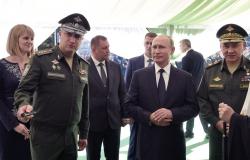In a moment of unprecedented crisis, following the most devastating terrorist attack that Russia has seen in almost two decades, Russian expectations were that Vladimir Putin would discuss immediate measures by which the security authorities would retaliate against ISIS terrorists , specifically those from Khorasan province, located in Afghanistan. These terrorists long ago declared their war against Russia and directly against the Russian President.
Laurentiu PlescaPhoto: Personal archive
Instead, the audience witnessed an unexpected approach. Putin failed to mention the failure of Russian security forces, including the dreaded KGB, to prevent this tragic event, instead blaming it, as usual, on Ukraine.
Putin points the finger at everyone but himself
Vladimir Putin issued a statement about the worst terrorist attack to hit Russia in 20 years, but instead of telling us that his security forces – the KGB – failed miserably to prevent this tragic attack , he pointed the finger at Kiev, to somehow help him in the war in Ukraine.
More precisely, he suggested that it would be the hand of Kiev, without presenting any evidence in this regard. And this despite the clear warning sent by the United States on March 7 that a terrorist act is imminent in public spaces, including concert halls. In his speech to the FSB board, Putin described the US intelligence warning as blackmail, which is intended to destabilize Russian society.
The Russian leader has always presented himself as the guarantor of stability and order in Russia, who rules this country with an iron hand. However, internal chaos, citizen insecurity and the inability to provide adequate protection – including in the occupied territories of Ukraine – are eroding this perception. The leader from the Kremlin is losing your image as a strong leader.
At the moment, this insecurity and internal chaos persists in Russia. Amid fears of further terror attacks, security has been beefed up at major transport hubs. Public concerts and sporting events have been postponed. Three other shopping centers in Moscow have temporarily suspended their activity. The increase in incidents of violence, bombings and the general feeling of insecurity among citizens reflects the regime’s inability to maintain internal order. This is a major problem for a leader who has based his legitimacy on the promise of stability and peace. He has done this for 24 years since he has been president of Russia, but this also brought him another term as president.
Russia has long faced terrorist attacks
In its recent history, Russia has been rocked by a series of devastating terrorist attacks, which have deeply marked the country’s society and politics. These attacks occurred mostly under the leadership of Vladimir Putin, who became president against the backdrop of such tragedies, and paradoxically, they continued to be a dark part of his mandates.
Before Putin came to power in 1999, Russia was rocked by a series of apartment building explosions that killed 293 people in just two weeks. The attacks took place in Moscow and southern Russia, leaving a deep wound in the heart of the nation. The Russian government quickly blamed separatist terrorists in Chechnya for the attacks. Vladimir Putin, then prime minister, used these tragic events to justify a harsh military campaign against Chechen separatism, marking the beginning of an era of violent confrontation.
One of the most shocking terrorist events under Putin was the hostage crisis in Moscow’s Dubrovka theater in October 2002. A group of Chechen terrorists took 912 hostages, demanding the withdrawal of Russian troops from Chechnya. The tragedy ended after three nightmare days, with 132 victims, most of them dying from the gas used by Russian special forces to immobilize the attackers.
Perhaps the most tragic was the Beslan school siege in September 2004. More than 1,100 people, mostly children, were taken hostage by a group of terrorists. The situation ended after three days of terror, with a death toll of 334, of which 186 were children. This event went down in history as one of the bloodiest terrorist attacks in the world and underlined the vulnerability of civil society in the face of terrorism. All these attacks show us that Russia has been dealing with terrorism for a long time.
However, why was Russia chosen in this terrorist attack? Because ISIS-K in Afghanistan attacked mainly for reasons related to the history of conflicts and Russian relations in the region. These include the Soviet invasion of Afghanistan, Russian actions in Chechnya, Vladimir Putin’s close relations with the Syrian and Iranian governments, as well as Russia’s military campaigns against ISIS fighters in Syria and elsewhere, including through Wagner Group mercenaries.
These terrorist attacks, carried out amid a long conflict with Chechen separatists, have left a deep mark on Putin’s Russia. Using these tragedies as a pretext for strengthening national security and consolidating executive power, Putin has succeeded in cementing his image as a relentless leader in the fight against terrorism. However, these events have also raised serious questions about the new anti-terrorism law of 2006, which, in addition to introducing effective security measures, restricts the rights of Russians, but also the freedom of the opposition in Russia, because it also affects political opponents, but also promoters of sexual minorities.
Do tougher laws cover up system incompetence?
This incident highlights the incompetence of the Russian security system to act promptly and effectively. In theory, a robust security apparatus like the one Russia claims to have should be able to anticipate and neutralize such threats before they materialize. In practice, however, a major gap in the ability of this system to protect its citizens was highlighted, and the length of time required to identify and capture the perpetrators of this terrorist act also speaks to the shortcomings of the Russian system.
Senior members of the Russian president’s regime have called for the country to re-introduce the death penalty following a terrorist attack in a suburb of Moscow. However, following this initiative, alarm has been raised about this request, including due to Russia’s widespread use of anti-terrorism and anti-extremism laws to target opponents of the Kremlin and supporters of Ukraine.
Although the protests are suppressed, there is a significant level of discontent among the population in Russia. _Read the entire article and comment on contributors.ro






